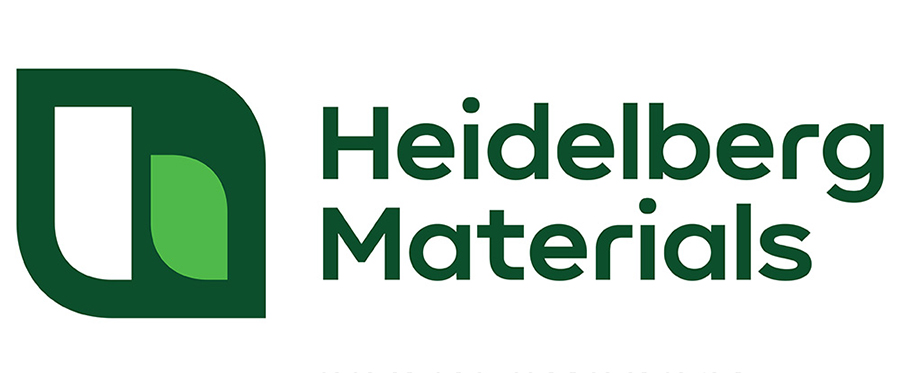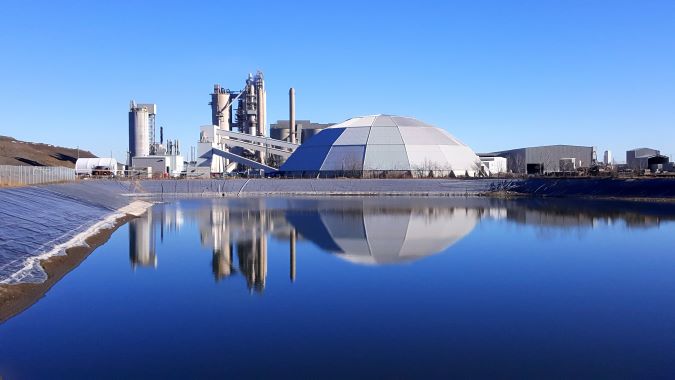A low carbon future for cement is advancing through a unique feasibility study to see carbon capture and storage (CCS) on Lehigh Cement’s plant in Edmonton, Alberta. Recognizing the substantial role that large-scale CCS has in reducing greenhouse (GHG) emissions, Lehigh Cement, the International CCS Knowledge Centre (Knowledge Centre), and Mitsubishi Heavy Industries (MHI) Group are moving forward with the engineering design for this feasibility study of the cement plant’s carbon capture system.
A first for the North American cement industry, the Lehigh CCS Feasibility Study looks at the viability of capturing 90-95 per cent of the carbon dioxide (CO2) - an estimated 600,000 tonnes of CO2 annually - from the cement plant’s flue gas. The study is also a first for each of these organizations in North America all of whom pledge to actively work toward decarbonization.
The study is timely as the recently released Canada Climate Plan specifically indicates that it will develop a comprehensive CCS strategy and explore other opportunities to help keep Canada globally competitive in this growing industry.
With experience gained through the design, construction, operation, and subsequent enhancements/modifications of the SaskPower Boundary Dam 3 CCS Facility (BD3 Facility), the Knowledge Centre, along with MHI Group and their collaborative work on the Shand CCS Feasibility Study, continue to be at the forefront of post-combustion capture processes globally and see an opportunity for CCS across post-combustion industries.
Due to the remarkable similarities in flue gases, the expertise acquired at the BD3 Facility can be adapted to the cement sector with experienced-based guidance from the Knowledge Centre. The Lehigh CCS Feasibility Study will look to an engineering design that tailors the carbon capture technology owned by Mitsubishi Heavy Industries Engineering (MHIENG), part of MHI Group, so called KM CDR ProcessTM being deployed at 13 commercial plants globally, for integration with Lehigh’s plant and output specifications, such as a flue gas pretreatment system and the carbon capture and compression process.
With cement demand on the rise and as a sector that is challenged with further abating emissions, large-scale CCS could well become the definitive solution to cut GHGs. The Lehigh CCS Feasibility Study explores the value of this for the cement industry, by encompassing engineering designs, cost estimation and an in-depth business case analysis.
“This CCS feasibility study is essential for understanding how our industry can continue to meet growing production demands, while also meeting equally important climate targets," said Joerg Nixdorf, President, Lehigh Hanson Canada Region. "We are proud to be in a position to lead a global change with a crucial clean technology in our industry."
QUICK FACTS
- The Lehigh CCS Feasibility Study is being jointly conducted by the Knowledge Centre and Lehigh Cement with a target delivery of fall 2021.
- The objectives of the study are to deliver a Class 4 cost estimate; to work with a capture technology provider (MHI Group) to perform engineering design tailored to the Lehigh plant; to manage the process and engage third parties, as necessary; to complete a detailed business case; and to develop the budget for Front End Engineering Study (FEED).
- This initiative has received $1.4M in funding from Emissions Reduction Alberta (ERA) through its Partnership Intake Program. ERA's investments help innovators develop and demonstrate GHG-reducing technologies that lower costs, improve competitiveness and accelerate Alberta’s transformation to a low carbon economy. For more info, go to https://eralberta.ca/.
For additional details, click the link below to read the complete news release.
Low Carbon on Cement Possible with CCS


